Gluten-Free Pasta You Need To Try
Gluten-Free Pasta Options You Need To Try
Share the post
Share this link via
Or copy link

Source: FreshSplash / Getty
When the world first began to realize that gluten was an issue (and when I say world, I mean America—my relatives in Europe and good friends in Latin America think the gluten-free craze is senseless), options were limited for those trying to avoid the problematic ingredient. There were a lot of lengthy and questionable ingredients lists on gluten-free food. It seemed that the food industry had swapped in every genetically modified food imaginable in place of that little evil gluten, making it almost more worth it to just eat the gluten stuff.
Of course, we all know who got hit the hardest by a gluten-free diet: pasta lovers. Well, bread and pasta lovers, to be specific. These are two foods that at first seemed very hard for food manufacturers to get right if they were going to skip the gluten. Everything was either super dense, too chewy, or so fragile it’d fall apart the moment you touched it. And pasta and bread lovers know that consistency is so important with that food. I know that the first few bags of gluten-free pasta I tried about eight years ago or so left me with some digestive issues I’d rather not discuss here (and you’d rather not hear about, I’m sure). But, eating gluten-free isn’t easy.
Now, luckily, there are far more options when it comes to good gluten-free products. In fact, rather than feeling like I’m missing anything by eating gluten-free pasta, I actually think much of the gluten-free stuff brings more to the table. It’s far more nutritionally rich than traditional pasta, and can be pretty diverse in flavor. Companies are getting way more creative when it comes to the ingredients they choose, and it’s lead to some really tasty and interesting spaghetti, fusilli, macaroni, and all the classics. If you don’t know what’s out there, here are gluten-free pastas you should try.
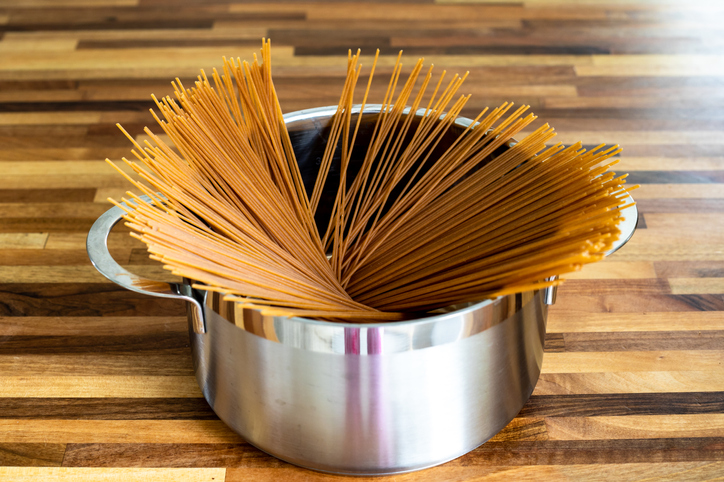
Source: Photographer, Basak Gurbuz Derman / Getty
Brown rice and quinoa
Love MadameNoire? Get more! Join the MadameNoire Newsletter
We care about your data. See our privacy policy.
Brown rice and quinoa pasta has a really nice, slightly grainy texture due to the brown rice, but still gets its firmness from the quinoa. Plus, it’s loaded with fiber, protein, and minerals. If you are a vegetarian and looking for more meat-free sources of protein, just add veggies and your favorite sauce to this pasta and you’ll feel plenty satisfied.
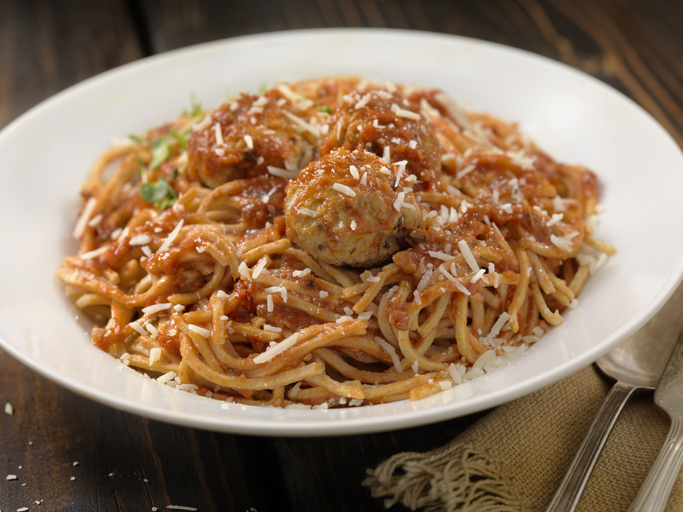
Source: LauriPatterson / Getty
How to eat it
This grainy brown pasta will complement a nice parmesan-heavy, herby pesto sauce. The earthiness of the basil mixed with the brown rice goes very well together. It can also be the base for a traditional Bolognese (or a meat-free variety with soy crumbles or Beyond meat) as its texture goes nicely with the crumbled meat, and it soaks up red sauce well.
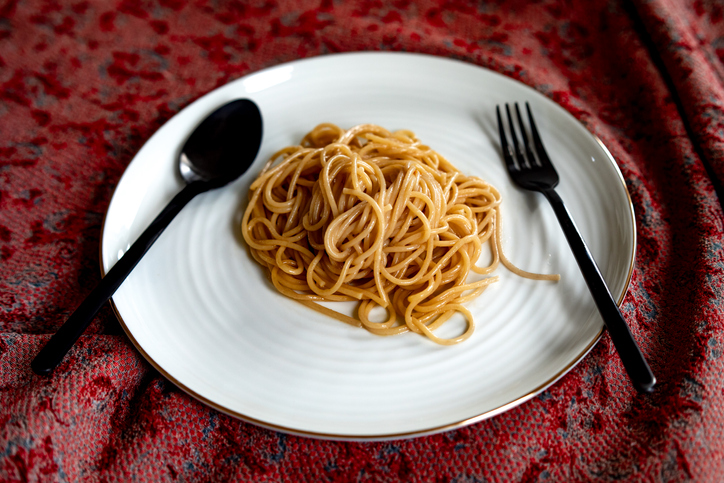
Source: Photographer, Basak Gurbuz Derman / Getty
Corn and quinoa
At first, there was a lot of gluten-free pasta that was just corn-based. That’s fine, as corn boasts some nutrients, but it was a little bland and not exactly overflowing with vitamins and minerals. Now, you can find a lot of corn-quinoa hybrid gluten-free pasta. The corn helps it achieve that consistency found in traditional pasta, while the quinoa pumps up the protein profile again.
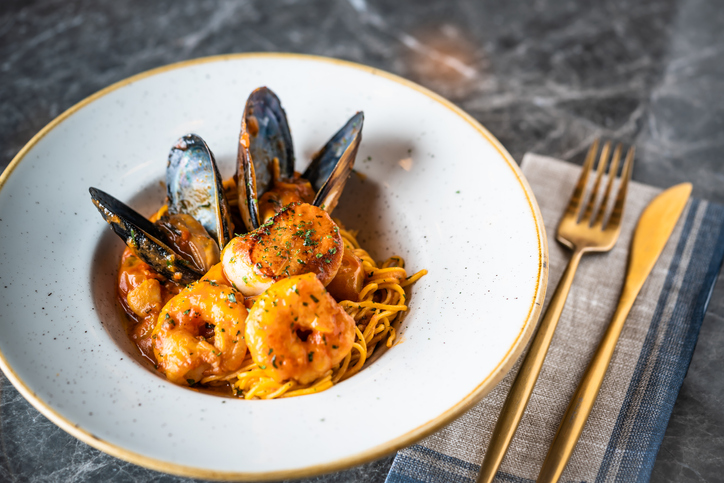
Source: CHUNYIP WONG / Getty
How to eat it
If you’re into creamy sauces like Alfredo, or you’re looking to make linguini and clams, corn and quinoa pasta is a good choice. These recipes tend to go best with a simple white pasta, and corn and quinoa is about as close as you can get in texture and flavor to the original stuff.

Source: REDA&CO / Getty
Red lentil
Red lentil pasta is a bit newer to the shelves of chain supermarkets, but you’ll see it start popping up. This stuff is absolutely packed with protein, boasting roughly 13 grams per two ounces, and has tons of minerals, too. If you like a limited ingredients list, some of the brands out there have nothing but red lentils in their pasta.
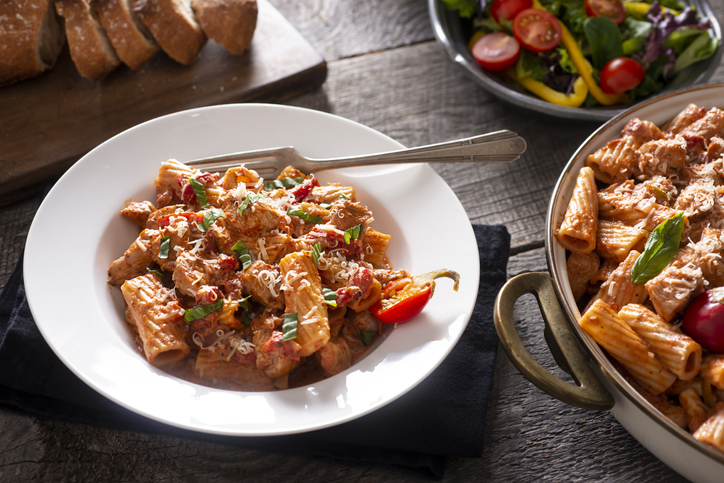
Source: rudisill / Getty
How to eat it
Red lentil pasta can get mushy quickly, so keep an eye on it, testing it every couple of minutes of boiling. So long as you drain it in time, it can have a nice, firm consistency. Lean into the rich flavor of this stuff by adding marinara sauce, or, keep it simple by just adding garlic, veggies, olive oil, crushed pepper, and parmesan cheese.
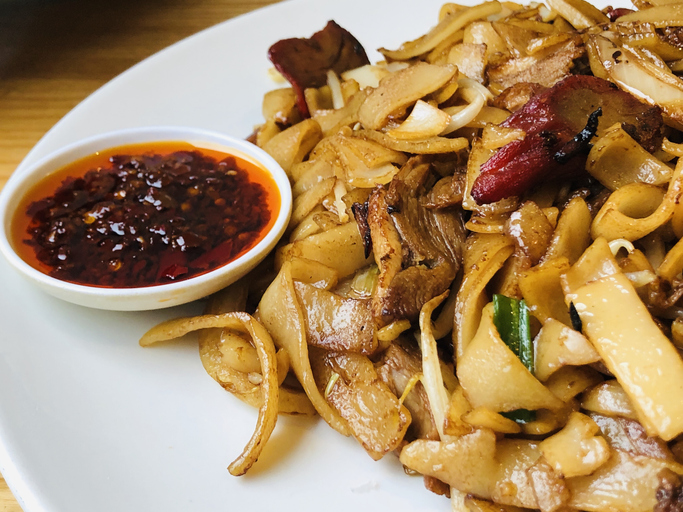
Source: Sergio Amiti / Getty
Rice noodles
White rice noodles admittedly don’t offer much in the protein or fiber department, but, if you want a simple, wide and flat noodle that reminds you of the house-made stuff at Italian restaurants, this is actually the way to go over store-bought gluten-free fettuccini. Flat white rice noodles don’t break easily, which you need when twirling them around in your buttery sauces.

Source: Jordan Lye / Getty
How to eat it
Rice noodles are the perfect addition to a beef or bone broth soup. If you prefer Asian-fusion recipes, they’re ideal for your drunken noodles, stir fry, or anything with Sriracha. They are very mild in flavor, so they take up spices nicely. If you’re in the mood for something comforting, they’re perfect under beef stroganoff.
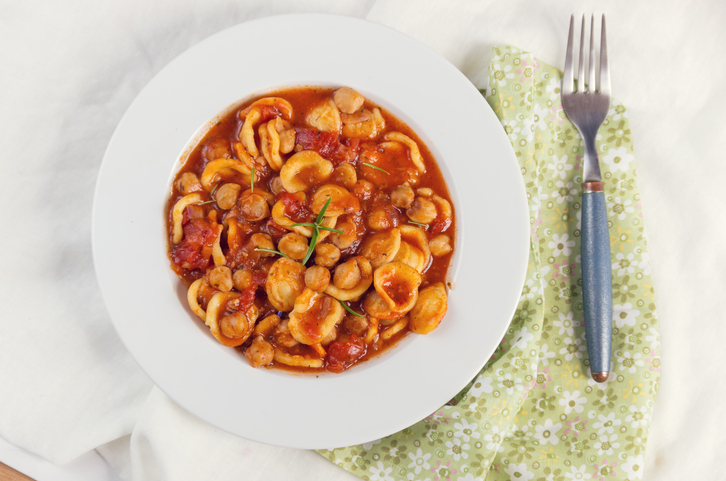
Source: CreatiVegan.net / Getty
Chickpea
Chickpea or garbanzo bean pasta should be on every vegetarian or vegan’s shopping list, because it’s loaded with protein—roughly 15 grams per two ounces of the stuff. It also boasts a generous amount of fiber, and has a dense consistency that shouldn’t fall apart when cooked.
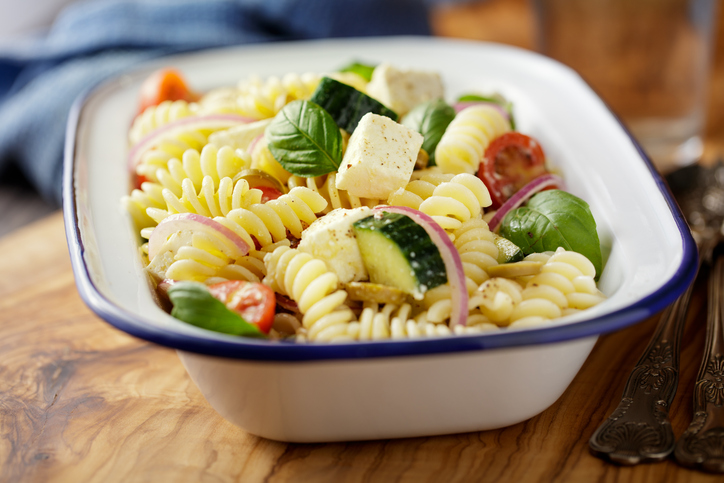
Source: haoliang / Getty
How to eat it
This is another pasta that takes up creamy Alfredo nicely, as well as creamy Vodka sauce. If you’re looking to make a pasta salad, it’s quite flavorful when cold, and makes a great addition to a Greek-inspired pasta salad with olives, feta, cucumber, and tomato, with a little lemon juice and olive oil.

Source: Claudia Totir / Getty
Almond flour
If you can’t handle any sort of grain, brown rice pasta is out, and if you can’t handle soy, many products are off the table for you. Almond flour pasta, however, is a good choice for truly sensitive diners—at least those who don’t have a nut allergy. Plus, almond flour pasta cooks very fast—like one to two minutes fast, so keep a close eye on it.
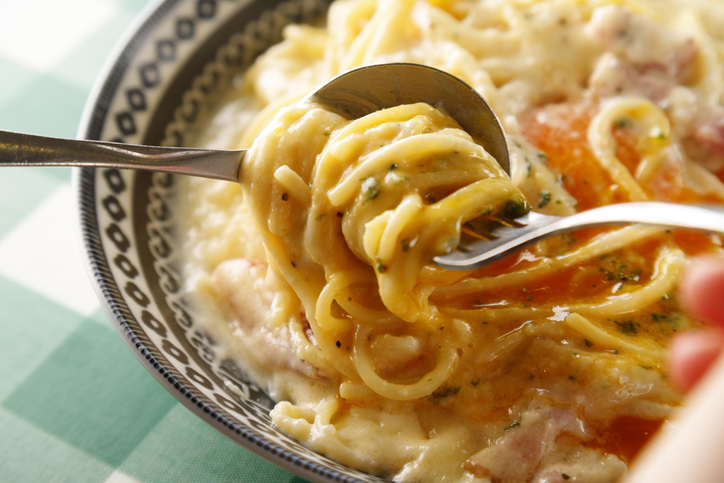
Source: Takanori Ogawa / Getty
How to eat it
This stuff is about as close to it gets to fresh, handmade pasta you’d find in an Italian kitchen, so put just about whatever you want on it. Also know that it keeps well in the freezer (raw), so you can extend its life if you don’t plan on using it soon. It’s mild flavor makes it ideal for a pasta Carbonara, or anything with pancetta.
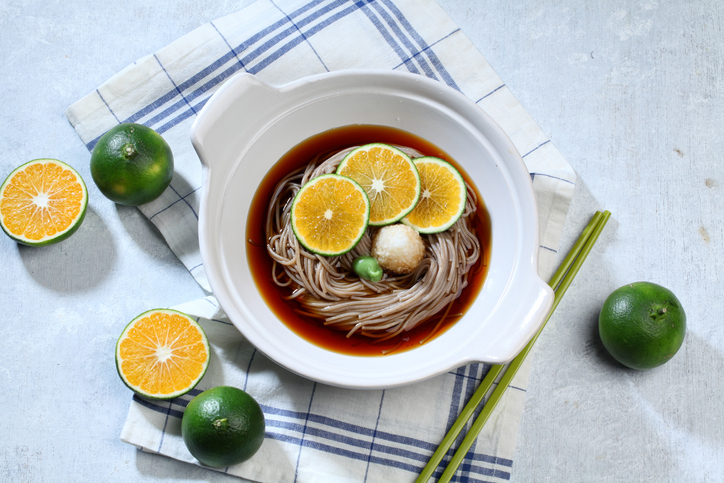
Source: studio416 / Imazins / Getty
Soba noodles
You’ll often find these in Asian soups, though you can do much more with them. Soba is just the Japanese name for buckwheat, though keep in mind some manufacturers mix regular flour in with their buckwheat in soba noodles, so check the packaging. They’re thin—almost as thin as spaghetti noodles.
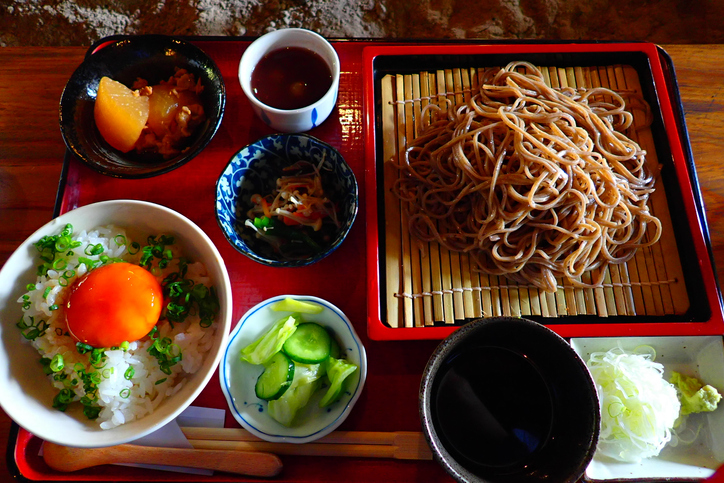
Source: Photo by Yohsuke Ikebuchi / Getty
How to eat it
Soba noodles go great in soup—whether it’s a comforting beef broth or a spicier base—because they have a hearty flavor and earthy texture. They’ll go very well with some soy sauce, sesame oil, sesame seeds, green onions, and grilled protein of your choice. These are good hot or cold, so chill the leftovers and eat them later.
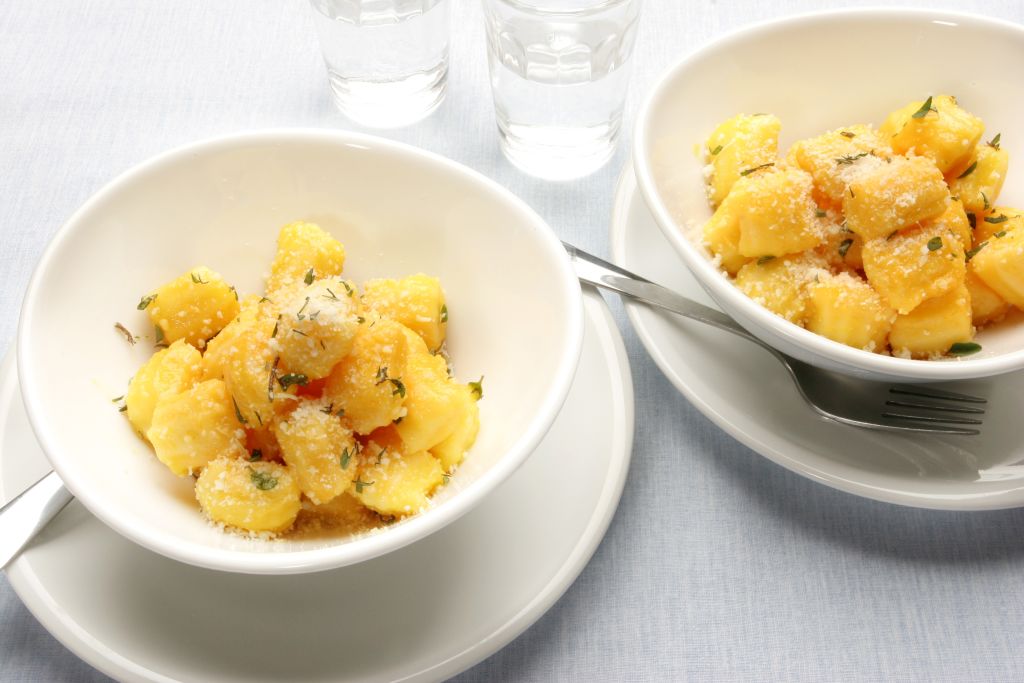
Source: REDA&CO / Getty
Potato gnocchi
Gnocchi has always been a potato-based food, but it’s traditionally blended with regular flour. However, because it’s base is that lovely, starchy root vegetable, it holds up well without regular flour, so whatever gluten-free variety you choose to buy should taste almost exactly like the traditional recipe.
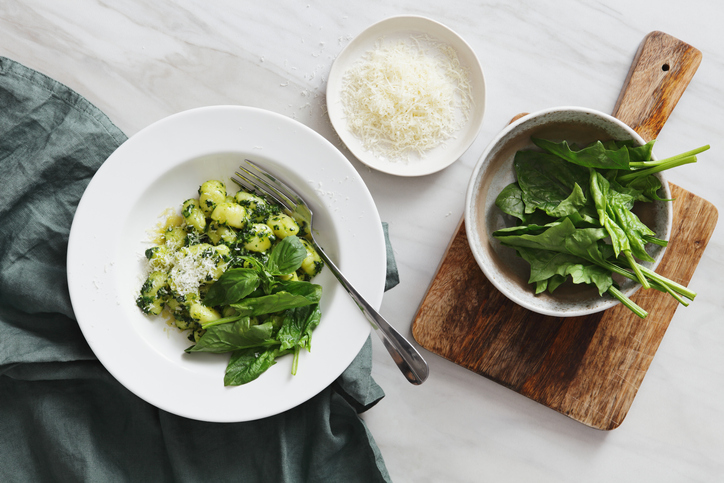
Source: luchezar / Getty
How to eat it
For a truly hearty dish that makes use of the gooey, doughy consistency of this pasta, make a meat or veggie ragout with your gnocchi. It also tastes great with shredded chicken and pesto sauce, or Pomodoro sauce. If you’re making beef goulash and want an alternative to potatoes, add gnocchi.
-

'The Street I Grew Up On Is Now Named After Me' — Trailblazer Dominique Morgan On Pride, Power And Blackness
-

Things That Make Your Period Late That Don't Have To Do With Pregnancy
-
Cute Things Guys Do That Make Our Ovaries Want To Grab Them
-

Ways To Makes A Profit (Or At Least Break Even) From Your Wedding



